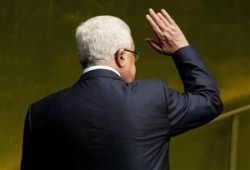The Right’s Curious New Tack on Palestinian Statehood
September 28, 2011

In some quarters of the neoconservative media, commentators are experimenting with a surprising new objection to the Palestinian statehood bid: its exclusion of Palestinian refugees.
In an interview with Lebanon’s Daily Star, a PLO diplomat told a reporter that Palestinian refugees living outside of the Occupied Territories were unlikely to receive citizenship in a new state, which Commentary blogger Evelyn Gordon called “simply unbelievable.” She continued, “For years, the world has backed a Palestinian state on the grounds Palestinians are stateless people. And now…most Palestinians will still be stateless.”
This critique was echoed by David Meir-Levi, a columnist for David Horowitz’s Front Page Magazine, who wrote, “The leaders of the Palestinian Authority are abrogating their own supposedly ‘sacred right of return,’ their hitherto uncompromisable demand.”
This is, at first glance, a curious critique. On the one hand, it resembles a progressive critique leveled by Electronic Intifada’s Ali Abunimah, who has argued that the bid “would effectively cede the 78 percent of historic Palestine captured in 1948 to Israel and would keep refugees from returning to what would then be recognized de facto as an ethnically ‘Jewish state.’” On the other, it would seem to overlook the Israeli government’s much more prominent role in maintaining the status quo for Palestinian refugees.
Gordon and Meir-Levi, however, reach a different conclusion altogether: that the statehood gambit is less about Palestinian enfranchisement and more about the elimination of the state of Israel. “The refugees can’t be given citizenship,” writes Gordon. “[T]hat would undermine [the Palestinian leadership’s] demand to resettle them in Israel, thereby destroying the Jewish state demographically.” Meir-Levi is even more apocalyptic: “This admission clarifies beyond rational doubt that support for a Palestinian state is support for the destruction of Israel and the genocide of its Jews.”
The right of return largely concerns refugees and their descendants from what is now Israel proper, not Gaza or the West Bank. Although pro-Palestinian voices certainly debate the relevance of the statehood bid to these refugees, gaining citizenship in a state defined outside Israel’s 1967 borders would do nothing to resettle these refugees in their erstwhile homes in Israel itself—something required by UN Resolution 194 but never implemented by the state of Israel.
Furthermore, Abbas at least rhetorically affirmed his commitment to the rights of refugees in his address to the General Assembly. For this he was criticized by Commentary editor Jonathan Tobin: “If he gets his way,” Tobin wrote, “Abbas will have a Jew-free state in the West Bank and Gaza next to a Jewish state that will have to live under the threat of being deluged with Palestinians who would transform it into yet another Arab state.”
Abbas’ critics have damned him if he does and damned him if he doesn’t. But this seemingly unreasonable insecurity reflects a seldom-spoken political fact: that much of Israel exists on land obtained by the displacement of Palestinians, and Israel’s security will never be assured until the status of these people is resolved in a fair and just manner.
—Peter Certo
